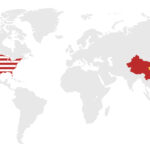Saudi Arabia and Russia vie for market share in China
Monthly oil imports to China in February were 20% higher in 2016 than the year before. The increased level of imports in February were the highest ever on a daily basis as the country takes advantage of low oil prices to increase stockpiles, reports Reuters.
Saudi Arabia made up the largest portion of China’s February imports, with shipments averaging 1.38 MMBOPD, slightly below a record 1.39 MMBOPD in February 2012.
Imports from Russia came in third behind Angola, with shipments of 1.03 MMBOPD, up almost 48% from last year. Russia is increasingly shifting its economy to markets in the east as tensions with the U.S. and Europe continue to deteriorate. Russian state-owned oil giant Rosneft (ticker: RNFTF) announced a number of deals with India this past week as well as the country looks to deepen ties with growing economies in the east.
Imports from Russia have surpassed imports from Saudi Arabia in China six times since November 2014, most recently in December. Russia could further expand its share of the market if it is able to tap into China’s teapot refiners, which have been approved for an import quota of 1.8 MMBOPD, roughly 20% of the country’s total crude imports.
Russia’s shift east has also left a vacuum in Europe, which Saudi Arabia has increasingly filled as Europe looks for new sources of energy.
Facing their first ever quarterly losses, Chinese oil companies look at writedowns
While China continues to buy an increasing amount of crude oil, some of its largest domestic producers are looking at their first ever quarterly losses. Analysts are predicting that PetroChina, the country’s biggest oil and gas producer, and CNOOC, its largest offshore explorer, may write down as much as $4.3 billion in assets in their earnings reports this week, forcing them to report losses, reports Bloomberg.
PetroChina, CNOOC and China Petroleum & Chemical Corp (Sinopec, ticker: SNP), Asia’s biggest refiner, “will unveil sizable impairment writedowns for 2015,” said Gordon Kwan, head of Asia oil and gas research at Nomura Holdings. “These impairment charges are non-cash in nature and there could be write-backs if oil prices surge in the coming years.”
Low oil prices have forced China’s major producers to cut back production and spending this year. Sinopec announced last month that the company will shut in four of its least profitable sites due to low oil prices. CNOOC also said in January that it would be cutting its production target for the year by 5% from 2015 levels, and cutting capital spending by 12%.






